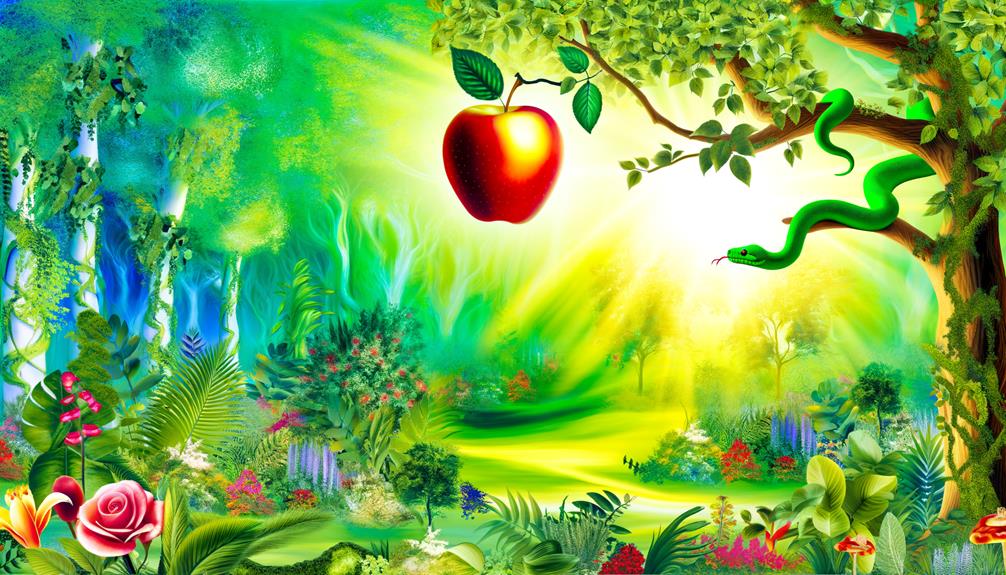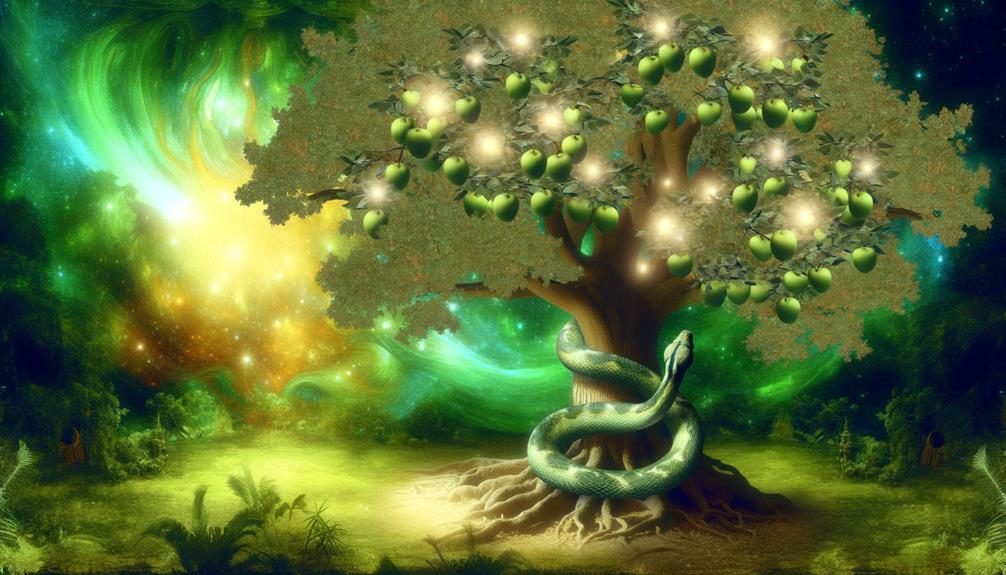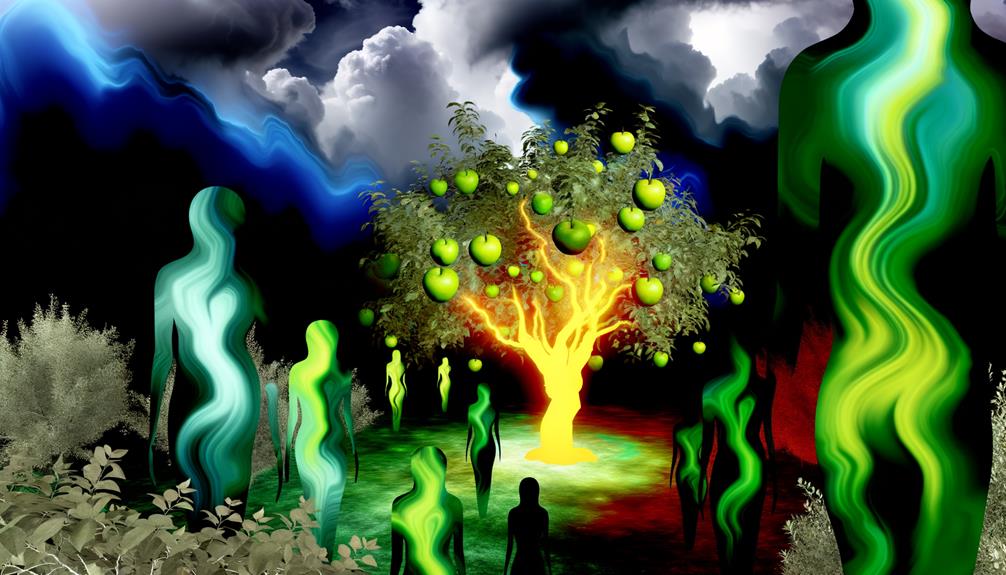Forbidden Fruit Meaning In The Bible: Temptation and Fall
In the Bible, the term ‘forbidden fruit‘ epitomizes the themes of human disobedience and the subsequent moral ramifications of defying divine edicts. It involves the Tree of Knowledge of Good and Evil, where Adam and Eve’s consumption introduces sin, moral awareness, and mortality to humanity.
This act highlights the interplay between temptation and free will while underlining the profound impact of ethical decisions on human destiny. The narrative juxtaposes enlightenment and transgression, portraying the existential shift from innocence to experienced knowledge.
Continued exploration of this theme provides deeper insights into its theological and ethical complexity.

Forbidden Fruit Meaning in the Bible: Temptation, Sin, and Spiritual Consequences
| Aspect | Biblical Insight |
|---|---|
| Phrase Origin | Genesis 2:17 – The tree of the knowledge of good and evil |
| Literal Meaning | The fruit God commanded Adam and Eve not to eat |
| Spiritual Symbolism | Temptation, rebellion, and human desire to override God’s will |
| Key Scripture | Genesis 3:6 – Eve eats the fruit, leading to the fall of man |
| Moral Teaching | Disobedience to God leads to separation, but redemption is offered through Christ |
| Application | A caution against yielding to temptation and seeking wisdom apart from God |
Biblical Context

The concept of the forbidden fruit in the Bible originates from the Genesis narrative, where it symbolizes the essential moment of human disobedience and the consequential fall from grace.
Within the context of the Garden of Eden, the fruit represents more than just a physical entity; it embodies the moral and spiritual ramifications of defying divine command.
The narrative intricately portrays the act of eating the forbidden fruit as a transgression that introduces sin and mortality into human existence.
The story’s enduring significance lies in its exploration of themes such as free will, temptation, and the inherent consequences of human actions.
Therefore, the forbidden fruit serves as a vital element in understanding the broader theological and ethical dimensions within the biblical text.
The Tree of Knowledge

The Tree of Knowledge in the biblical narrative serves as a potent symbol of both enlightenment and transgression, embodying the dualistic nature of awareness and disobedience.
The act of consuming its fruit catalyzed profound theological and existential consequences, fundamentally altering the human relationship with the divine.
Analyzing this event necessitates a nuanced understanding of its symbolic significance and the ensuing ramifications for humanity as depicted in the scriptures.
Symbolism of Knowledge Tree
In biblical literature, the Tree of Knowledge often serves as a profound symbol representing the duality of enlightenment and moral discernment. Situated in the Garden of Eden, this tree embodies the pivotal shift from innocence to the awareness of good and evil, illustrating humanity’s complex relationship with divine commandments.
The tree is not merely botanical but a theological construct, encapsulating the essence of human free will and the inherent risks of moral autonomy. Its presence underscores the perpetual tension between obedience to divine law and the pursuit of personal wisdom.
This duality is further enriched by its juxtaposition with the Tree of Life, thereby framing the human experience within a broader narrative of choice, consequence, and existential inquiry.
Consequences of Eating Fruit
Transgression of divine commandment marked a profound transformation in human existence, initiating a cascade of moral and existential consequences.
The act of consuming the forbidden fruit from the Tree of Knowledge, as narrated in Genesis, resulted in the immediate awareness of nakedness, symbolizing the loss of innocence and purity. This newfound knowledge precipitated a rupture in the relationship between humanity and the divine, leading to expulsion from Eden.
Consequently, humanity faced mortality, laborious toil, and pain in childbirth, fundamentally altering the human condition. The moral implications underscore themes of disobedience, free will, and the inherent tension between divine authority and human autonomy.
Ultimately, the narrative illustrates the profound impact of ethical choices on the human existential journey.
Symbolism of the Fruit

The symbolism of the forbidden fruit in the Bible encapsulates both the pursuit of knowledge and the act of disobedience, serving as a pivotal moment in the narrative of human fallibility.
By consuming the fruit, Adam and Eve not only violate divine command but also acquire moral awareness, signifying the complex interplay between enlightenment and transgression.
Consequently, this act underscores significant moral consequences, setting a foundational precedent for the themes of sin and redemption throughout biblical literature.
Knowledge and Disobedience
How does the act of consuming the forbidden fruit in the Bible symbolize the profound intertwining of knowledge and disobedience, thereby altering the course of human existence? This act signifies a pivotal moment where the pursuit of knowledge led to an act of defiance against divine command.
The forbidden fruit embodies not merely the quest for wisdom but also the inherent consequences of disobedience. This duality is critical in understanding the broader implications of this biblical narrative.
| Aspect | Symbolism |
|---|---|
| Knowledge | Enlightenment, awareness |
| Disobedience | Rebellion against divine authority |
| Human Condition | Shift from innocence to experience |
| Divine Command | Boundary setting, moral law |
| Consequence | Fundamental change in human-divine relationship |
This table illustrates the multifaceted symbolism of the fruit, highlighting its role in the transformative biblical episode.
Moral Consequences
By delving into the moral consequences symbolized by the forbidden fruit, one can discern its pivotal role in illustrating the profound ethical ramifications of human actions in the biblical narrative.
The act of consuming the forbidden fruit by Adam and Eve is emblematic of disobedience to divine command, leading to the fall of humanity.
This narrative serves as an allegory for the inherent tension between divine law and human free will.
The fruit, consequently, is not merely a literal entity but a metaphor for the moral blindness and resulting estrangement from God that ensues from transgression.
It underscores the gravity of ethical accountability and the far-reaching impacts of moral decisions on individual and communal destinies.
Temptation and Disobedience

Although the narrative of the forbidden fruit is often interpreted through various theological lenses, it fundamentally underscores the profound themes of temptation and disobedience in the human condition. The story of Adam and Eve in the Garden of Eden symbolizes the inherent struggle between divine command and human free will.
Succumbing to the serpent’s persuasion, Adam and Eve epitomize the vulnerability of humans to temptation, leading to an act of disobedience against God. This disobedience represents a pivotal moment in biblical history, illustrating humanity’s inclination to defy divine authority.
| Aspect | Emotion Evoked |
|---|---|
| Divine Command | Reverence |
| Human Free Will | Empowerment |
| Serpent’s Persuasion | Suspicion |
| Act of Disobedience | Sorrow |
This table encapsulates the emotional gravity of these themes, highlighting their enduring impact on theological discourse.
Consequences for Humanity

The transgression of Adam and Eve in consuming the forbidden fruit precipitated a cascade of profound consequences for humanity, fundamentally altering the relationship between humans and the divine.
This act of disobedience led to their expulsion from the Garden of Eden, symbolizing a loss of innocence and direct communion with God. Humanity inherited a state of original sin, necessitating divine intervention for redemption. The narrative underscores the gravity of disobedience and its far-reaching implications.
Key consequences include:
- Physical Mortality: Introduction of death as an inherent aspect of human existence.
- Labor and Suffering: Increased toil and pain in both agricultural work and childbirth.
These elements underscore the enduring impact of the original transgression.
Modern Interpretations

In contemporary theological discourse, interpretations of the forbidden fruit narrative often reflect broader cultural, ethical, and existential concerns.
Modern scholars frequently examine the story through various lenses, such as gender dynamics, free will, and human fallibility.
Feminist theologians critique the traditional portrayal of Eve, arguing it perpetuates patriarchal stereotypes.
Existential interpretations focus on the fruit as a symbol of human agency and the quest for knowledge, highlighting the inherent tension between divine command and individual autonomy.
Additionally, ethical considerations arise regarding the nature of temptation and moral responsibility.
Conclusion
The forbidden fruit, an allegory for the human condition, symbolizes the perennial struggle between divine command and human curiosity. Its consumption marks the genesis of moral awareness, embedding the themes of temptation and disobedience into the fabric of human existence.
The ensuing consequences underscore a shift from innocence to experience, forever altering humanity’s spiritual and existential trajectory.
Contemporary interpretations continue to explore this ancient narrative, revealing its enduring relevance and multifaceted symbolism.






